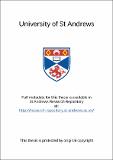Investigating the relationship between visual and contextual cues in visual word recognition
Abstract
A well documented finding in the word recognition literature is that accurate report of a word is facilitated when it is embedded in a meaningful and grammatical sentence. Previous researchers have accounted for the influence of context on word recognition in two ways. From a modular perspective, word recognition is unaffected by sentence structure or content, the effects arise from post-perceptual decisions and from spreading activation between associated words within the lexicon. In contrast, from an interactive perspective, word recognition receives direct facilitation from sentence content and structure either by pre-activating or constraining activation to likely word candidates. The experiments reported in this thesis investigate the role of sentence contexts in visual word recognition in order to distinguish between modular and interactive perspectives. This was done by contrasting the effects on target word perception produced by legal, word replacement, nonword and transposed sentence contexts when the effects of semantic word association were suppressed. Performance was measured using the alternate forced choice Reicher-Wheeler Task to suppress the influences of sophisticated guesswork. Low constraint legal sentences produced superior accuracy than control contexts. High constraint legal sentences containing predictable and unpredictable target words but little word association produced superior performance for predictable targets over all other context conditions. When predictability was made more salient by increasing the amount of legal sentences in the experimental session there was no reliable effect of context. However, predictable targets were reported more accurately and unpredictable targets less accurately in legal and transposed contexts than in control conditions. Blurred target words in low and high constraint sentences produced legal sentence advantages. These findings suggest that legal sentence contexts do influence actual word perception at low relatedness proportions but not at high relatedness proportions. The findings favour the dual route multistage activation model of context effects on word recognition.
Type
Thesis, PhD Doctor of Philosopy
Collections
Items in the St Andrews Research Repository are protected by copyright, with all rights reserved, unless otherwise indicated.

